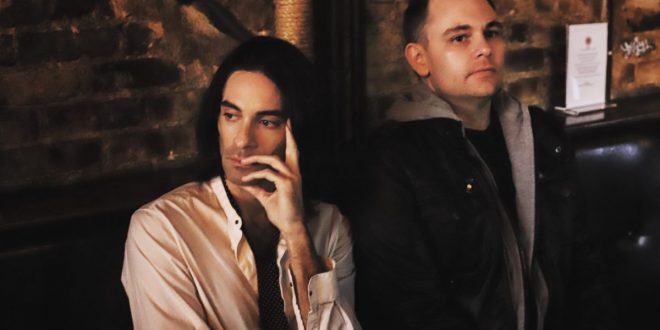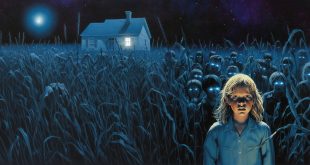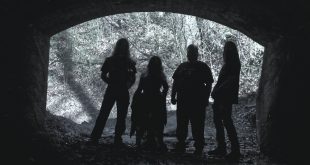After reviewing generic., the debut album of emerging New York-based band Silver Relics, I decided to follow that up by interviewing their frontman, Alex Sepassi. The band held an album release party last week, with several European dates lined up for June and July. Among the essential topics, we discussed how Sepassi’s current environment still holds resonance, the concept behind generic, as well as his enduring partnerships with bandmate Justin Alvis and their producer, Howie Beno.
ME: How was your record release party?
Alex: It was great! It was a nice gathering of everyone we’ve been seeing at the shows lately — basically our entire extended team. We just booked one of our favorite bars in the East Village, played the record a few times, and talked about it and anything else, really. Yeah, it was a lot of fun!
ME: What are you looking forward to most about your upcoming dates?
Alex: That’s a great question! A lot of things, but mainly performing alongside who I’d consider my heroes on some level. The places we’re playing are where a lot of these guys come from. Just to get an idea of what the environment is like over in Europe is what I’m really looking forward to, and sharing the stage with these artists. This is something that I’ve wanted to do from the beginning.
ME: As far as your influences go, you tend to showcase a lot of alternative rock and shoegaze in your sound. Did you take to those sounds immediately, or was it a while before they grew on you?
Alex: I wouldn’t say I took to anything immediately. With a band like Depeche Mode, for example, I wasn’t alive when their very early records came out, and to be honest with you, they’re not the type of band I’d normally listen to, so I’m going through their discography and kind of warming up to them that way. While writing generic., that’s the approach I took with the album. I’d gotten a lot of recommendations from friends and from Howie, and I started essentially living in the decade of those alternative rock artists.
When I was growing up, it started with listening to a lot of 60s bands. Stuff like The Beatles, Led Zeppelin, The Who, and The Doors, were what my parents liked a lot back then, so I’d gotten pretty familiar with those bands early on. The shoegaze elements are there, too; I’m glad you hear them. Certainly, the heavy guitars are akin to My Bloody Valentine. When you start looking at these arrangements and the production style as a whole, I think that they take a lot from these alternative influences like you’re talking about, more than anything else.
ME: In forming Silver Relics, you moved to New York City to get that going. Where were you guys from originally?
Alex: We were from Austin, Texas. I met Justin there years before at South by Southwest through some good friends of ours. He showed up one day, was like, “Hey, you need a drummer?” and I said, “Of course, who doesn’t need a drummer?” We’d gotten along very well, and have probably known each other for about 8 years at this point. We’ve always played together in some form during that time, and I was actually in New York initially before moving to Austin. I knew I was going to come back here at some point, so when that time came, we knew we needed to have the album completed.
ME: This album would become the basis for generic., is that right?
Alex: Pretty much — with the exception of the first song, “Fame,” which was done in October. Back in Austin, I had New York in the back of my head the entire time while writing the record. New York never really leaves you, and you never really leave it. Everyone has their own city or place to reference, and I thought the songs were representative of that. After being there, I felt as though this record took on an urban identity, but I didn’t have a way of knowing that otherwise.
ME: I know what you mean, man. I’m originally from Hawthorne, New York, and I moved to Florida recently. There’s a nostalgic aspect to it, not to mention a lot of stress from moving far away, but as long as you stick to your drive, you can make it happen.
Alex: Absolutely. Where are you in Florida?
ME: I’m in Tampa, but I still think about New York a lot.
Alex: Yeah, and I don’t think it really leaves you. You can certainly channel it in different areas. If you’re an image-oriented person, you’re going to figure out a way to keep yourself busy working toward something — possibly multiple things at once. With this record, it was about focusing, writing the best songs I possibly can, and getting the best drummer. That was my goal, and there wasn’t anything else on my plate at the time, so I feel lucky that I was able to stay focused through such an intense process.
ME: How did the concept for the album come about?
Alex: What’s funny is that I don’t really know the answer to that question, but I should; it’s a good question. In terms of concept records, Pink Floyd’s one of my favorite bands, and they make a pretty strong case for that. They make some of the best concept records, for sure. Because of that, I gravitated toward them.
For this record, the goal was more along the lines of, “I need to write songs that Justin and I will be excited about, and will be equally excited about playing on stage.” We wrote 12 songs, and we had to be proud of each and every one of them, without exception. I think it was the period of time when we were about to move, and everything around that, that really shaped the album’s themes. In a way, all of that became a concept — that small window of time that you’re capturing song by song. In every recording session, it was done in real time. Was it planned? I can’t really say. Maybe subconsciously on some level, but I don’t think there was anything pre-ordained in that sense.
ME: Tell me about “Time Bomb,” how it resonated with you to the extent of becoming a single.
Alex: I’d like to think of this song as a kind of slingshot. It’s the shortest song on the record, but it moves, you know what I mean? I think that feeling is enough to convey something like, “Hey, here we are; here’s our first single.” In the context of the entire record, I like to think that, lyrically, it’s pretty open, and not too obscure. If I had to summarize it, it represents a time when you ask yourself some questions, trying to figure out what the answers are, and not having anyone else around you to listen to you. Sometimes, you might not even want someone else there, and you strive to figure it out without waiting for their input. What you’d end up doing is just shouting at something — shouting at the sky, or whatever it is — and the next thing you know, it’s like a release. Every time I listen to that song, it’s like that, and I still feel like that sometimes. I think I probably will. I know I’ve felt like that before, but I feel lucky to be able to get this down. For me, it’s like getting an old Polaroid photo — something immediate.
ME: What resonated with me about the album was the pacing of each song. It’s a battle between patience and impulsiveness and trying to find that level ground, and I think you capture that very well.
Alex: Thank you. That really is the struggle, and I don’t think I’ve known anything else.
ME: In a way, each song represents a different aspect of that struggle. You have songs like “End of Zero” and “Time Bomb” focusing on someone’s actions amidst those circumstances, while “Cardiac” and “Colours” dive into more about the emotions and sensations a person feels while carrying out those actions.
Alex: That means a great deal to me to hear you say that, and based on what you gathered from the album, it feels like mission accomplished on some level. I think one of the other components of Silver Relics was to function as a kind of art project. It mainly centers around music, of course, but from that, there are other forms of expression. It’s about trying to paint this picture of what life is like, and this real-time feeling of what we’re all going through. Like you’d said, it’s patient, but at the same time, impulsive. With this record, it’s the closest I’ve ever gotten to capturing that feeling. The less you dwell on, the better the turnout, and from that whole experience, I think I have a lot left to share.
ME: When it comes to working with Howie, what do you notice about his style?
Alex: I don’t want to speak for Howie, of course, but at least in the studio, he’s quick. He’s intelligent and incredibly gifted, and he and I work extremely well together. And by the way, Justin shares those qualities, too. You have three people in the room together, with the common goal of fleshing these ideas into songs, and Howie has the ability to not only keep up with that, but refine those ideas — or feelings, or sentiments — that we’re trying to convey to anyone. Because if we don’t believe in them, how do we expect anyone else to? He seems to get that out of people, and his pace and our pace match; it’s just the right combination. We talk with each other almost every day, and see each other often, in order to keep this thing going.
ME: Overall, what have you learned from the experience of writing your debut album, putting it all into perspective?
Alex: I think what I’m most proud of is the risk involved. It can be intimidating when you’re starting out, but then once you complete the album, it’s a strong sense of accomplishment to have 12 songs that fully represent a part of your life. It’s documented, and anytime I want to reference it, I can pull it up. My hope is when other people listen to this, it’s something that resonates with them, and it’s something that they’ve gone through. I think this record not only encapsulated an idea of openness but in the way that I wanted it to. In that sense, the biggest accomplishment is being able to put that into words. Whenever it feels right, then it’s right. I’m glad for having taken that risk because I don’t think there would have been an option not to.
ME: The other part of the lesson is that when the music is ready, it’s ready. If it’s not, then it’s not. Another side of it, too, is that sometimes once you put something out, you start hearing something that you think shouldn’t be in there, but after a while, it grows on you. Did you ever have those moments?
Alex: Absolutely. I find that many musicians I know tend to not be the greatest judges of their own work. After a certain point, you have to have someone who understands what you’re about come in and say, “Hey, this is actually good! This is good enough, and this is what we’re working with, so shut up about it.” Up until that point, you start listening for what may seem like huge mistakes at first, but over time, they absolutely do grow on you and become an actual part of the art. It’s not just about living with them; it’s learning to appreciate them and feeling good about something you otherwise used to cringe at. There’s a big element of trust, too. If I have someone like Howie telling me if a song or idea is the right one, it’s my responsibility to recognize that and trust his insight. A lot of that had happened in the album, too — someone being able to create that filter and say, “Hey, enough’s enough; we’re good!” and then move on. It’s like a period at the end of a sentence.
ME: Lastly, anything you’d like to say to your fans?
Alex: We’re going to be in Dublin, Ireland on June 28th, and the other dates are on our social pages. Ultimately, I just want people to know how much it means to us that they’re listening in the first place. We put something out there, and for it to resonate with them is the single greatest feeling. I’m incredibly grateful and lucky to be talking to you right now about this. It’s what I’ve always wanted, and what I hope will continue, honestly.
Silver Relics Socials:
 Music Existence Because of Music, We Exist
Music Existence Because of Music, We Exist




